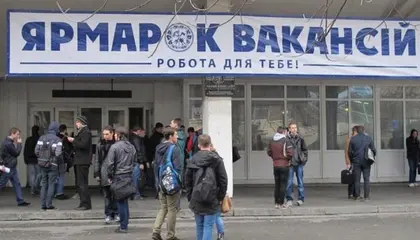Estimates issued by the National Bank of Ukraine (NBU) on Friday state that the second quarter unemployment rate was 35%, but the NBU expects the number to drop to 28.9% by New Years.
The unemployment figures track with a poll released earlier this week, by the Ukrainian Rating Group, which found that though 65% of respondents said that they had employment before the war, today 39% told pollsters that they were unemployed. Only 34% of Ukrainians said that their work had not changed at all since the war began, whereas 19% said that their work had become “remote,” and another 6% had found new employment.
- Check the most recent war in ukraine update in the Kyiv Post's daily news stories released today.
- Access the newest Ukraine news items published today.
JOIN US ON TELEGRAM
Follow our coverage of the war on the @Kyivpost_official.
The NBU cautioned that even though things would be rosier by January, due to the beginnings of economic recovery and a hotter job market, “as in other countries (for example, in former Yugoslavia), even after the end of active hostilities, unemployment will decrease slowly and remain at a higher level than before due to the long-term effects of the war.”
In citing the example of other post-war economies, the bank went on to say that they expected unemployment to decline to 27% during 2023, it is only expected to fall an additional 8.8%, to 18.2%, by the end of calendar year 2024.
Urging sobriety in analysis, the Bank said that though there was project to be a massive growth in nominal wages, 36.3% in 2023 and 31.3% in 2024, this should not be confused with “real wages.” “Nominal wages will grow rapidly, they will exceed the pre-war level as early as 2023. However, taking into account inflationary processes, real wages at the end of 2024 will still be below the pre-war level,” said the NBU.

Thinking Out Loud – Where We’re at, What’s at Stake, and What Ronald Would Have Said
Nominal wages were expected to decline by 12% in 2022, representing a 27% decline when accounting for inflation.
During a separate press conference on Friday, a United Nations World Food Programme official, Antoine Vallas, said that one-out-of-every-three Ukrainians now suffers from food shortages. The UN’s World Food Programme has actively sought to help Ukrainians during this period and has supplied over 2 million citizens with various forms of assistance to cope.
Despite the gloomy numbers, long term American Kyiv resident, Brian Mefford, an American, who founded Help Ukraine 22 to assist Ukrainians suffering as a result of the war, said that he thought this was a decisive moment of opportunity for Ukraine.
While acknowledging that the Ukrainian GDP was expected to retract by more than half, meaning that “it will be smaller than Napa Valley, California which has a GDP of $75 billion,” it was a chance for Ukraine to begin taking steps to implement reforms that would attract investors to Ukrainian markets.
“There is no better time to make radical changes than as during a war,” said Mefford, continuing that, “War is difficult for investors, however, it is precisely now that Ukraine should implement strong free market reforms.”
Mefford said that though things did not look good today, Ukraine should look ahead of how to prepare for a brighter day tomorrow and act now to prepare for it.
“Lincoln didn’t wait until after the Civil War to make radical reforms: He took charge, did not lose time, and did what was needed,” said Mefford.
You can also highlight the text and press Ctrl + Enter






